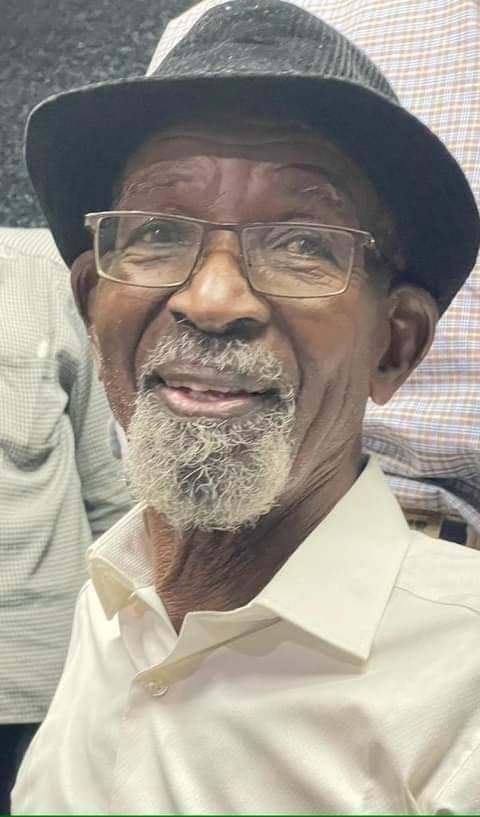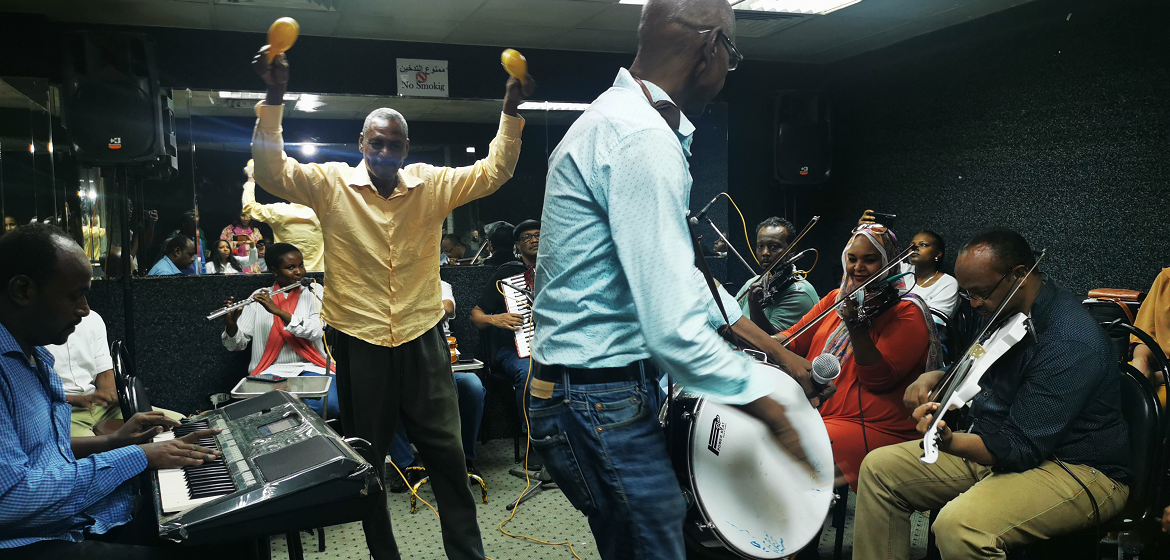Due to the current war, millions of Sudanese have fled the country – among them the Sudanese “King of Jazz”, Sharhabeel Ahmed. In Cairo, he stopped performing until the Sudanese Union of Artists in Egypt invited him back on stage.
On 15th April 2023, a war broke out in Sudan between the Sudanese Armed Forces (SAF) and the paramilitary Rapid Support Forces (RSF) – a war that has so far killed more than 5.000 people and forced about 6.9 million Sudanese to flee their homes.
The brutality of the war also took the lives of a number of artists: the well-known violinist Khaled Sanhouri died of hunger and thirst in his home in the city of Mulazemin near Sudan’s capital Khartoum. The famous singer and peace activist Shaden Hussein – best known for performing songs of Kordofani heritage – lost her life probably due to an air strike which hit her home in Khartoum´s twin city Omdurman. These incidents and the deteriorating humanitarian and security situation in the country prompted a large group of artists to depart from Sudan. They are not the only ones: Since the outbreak of the war, approximately 378.000 people fled from Sudan to Egypt, the majority of them moved to the Egyptian capital Cairo.
Overcoming isolation with a joint performance in Cairo
It was one of Cairo’s warm September nights in 2023; the sound recording studio Al-Arabi in the cozy middleclass area Dokki was crowded with musical instruments, musicians and artists. They sat together, quietly chatting away, until the King of Jazz, the famous Sudanese artist Sharhabeel Ahmed, 88 years old, entered the studio. Accompanied by his wife Zakia Abu Al-Qasim, Sharhabeel took his seat and listened to the rehearsals of songs that other popular Sudanese artists performed in competition with one another. Among them was Hadyia Talsem, one of the singers of the very successful all-female band Al-Ballabel. And the artist Omar Ihsas, who is celebrated worldwide for performing folklore music from the regions Darfur in the South-West and Kordofan in the South of Sudan.
This performance in the Al-Arabi studio was part of an initiative by a group of Sudanese artists and musicians. Prior to the performance, they had founded the Sudanese Union of Artists in Egypt, one of many initiatives run by Sudanese refugees in Egypt. The members had undergone a lengthy process to official register their union, but once they had accomplished this task, they did not waste time to fulfil their plan: bringing a rare and beloved artist, Sharhabeel Ahmed, out of his isolation and back on stage to defeat his and their own despair.
Their plan was successful. Upon Sharhabeel’s arrival in the Al-Arabi sound recording studio, everyone stood up to salute and welcome one of the most important musicians in Sudan´s musical history. For a few moments, the room exploded with applause and whistles of welcome and admiration. On that day, Sharhabeel ended his isolation which had lasted for four months, four months, which he had spent depressed in his temporary home in Cairo where he and his family had settled in after escaping the fires of war in Sudan.
Before coming to Cairo, Sharhabeel and his family had lived in the Riyadh-neighbourhood in Khartoum. Shortly after the beginning of the war in April 2023, the RSF extended their control over their neighbourhood and transformed their house into a zone for military operations. They set up military bases and checkpoints points on all main streets of Riyadh. This was part of their strategy to launch violent clashes from the ground against the bombing aircrafts of the SAF. These military operations led to a complete collapse in water, electricity, and communications services in Khartoum, forcing Sharhabeel and his family to leave their home and flee to Egypt.
Sudan’s King of Jazz: A multi-talented artist
Sharhabeel Ahmed is a multi-talented artist who sings, composes, and plays the guitar, oud (a musical instrument of Western Asia and Northern Africa belonging to the lute family), and violin. He is also famous for his paintings, poems and comic stories for children. But most of all he is regarded for his significant role in introducing Jazz to Sudan, which awarded him the title King of Jazz.
Born in 1935 in the Al Abbasiya-neighbourhood in Omdurman, Sharhabeel belongs to the golden era of Sudan’s modern popular musicians, who broadened their orchestra by using modern musical instruments. His musical talent was revealed in his childhood. At school he excelled in memorizing and performing poems, the so-called Madeeh. This term describes the recitation of poems in the vocal tradition of Islamic poetry where the performer praises the prophet Muhammad.
Sharhabeel’s first public performance was at the Khartoum South Cinema Theatre as an oud player in 1956. In the same year, he recorded songs for the Sudanese radio in Omdurman. After many attempts the text committee, which was responsible for endorsing new works for the Sudanese radio approved his work. This was a huge success: Sharhabeel’s songs were now broadcasted in the programme called “New Voices Corner”, which was hosted by the National Radio – the only radio station at that time in the country – and aired in many Sudanese households.
Three years later, Sharhabeel was officially recognized as a musician and introduced to the public audience. He participated in the opening ceremony of the Sudanese National Theatre in Omdurman and performed the song Ya helwat al-einain (English: “Oh, beautiful eyes”) written by Dhu al-Nun Bushr. Sharhabeel also participated in the first artistic mission for the Sudanese radio, traveling to the Sudanese city of Wad Madani in the 1950s as a violin player. His performance there was the first concert ever being broadcasted live on the radio outside the studios in Omdurman.
His music was influenced by his father’s records of Sudanese Hageeba
Later on, Sharhabeel founded his own band and named it after himself: Sharhabeel Ahmed. The band consisted of a number of musicians, including his wife Zakia Abu Al-Qasim, who played the guitar and so became the first Sudanese woman to play in a professional band. The band later also included some of his children, whereafter its name was changed to Family Band. With this band, Sharhabeel continued to play concerts in Sudan and abroad, for instance in Uganda, Chad, Democratic Republic of the Congo, Somalia, Kenya, Tunisia, Kuwait, Libya, Egypt, England, Germany, and Algeria.

Sharhabeel´s father played a big role in his musical upbringing. He owned a phonograph and records of Sudanese Hageeba[1](English: “briefcase”) songs, a combination of traditional Sudanese instruments, the Arabic oud, and military march music with brass wind instruments. This combination of styles is still audible in Sharhabeel Ahmed´s music. He combines brass wind instruments – such as the saxophone, trumpet, trombone and others like bass guitar, guitar or organ – with various Sudanese rhythms without deviating from the melodic line of contemporary Hageeba music.
Film soundtracks have influenced Sharhabeel’s music, too: Serene and charming melodies combined with short musical phrases characterize his work. Another recurring feature of Sharhabeel’s music is the use of the Sudanese Arabic dialect in his lyrical texts. Later in his career he sang several songs in foreign languages, including English, Swahili, and recently French. His music and performance style were new to the Sudanese musical tradition, which was based mainly on the pentatonic musical scale and the rhythms of the Sudanese Tum Tum, a specific style of rhythmic choral singing with romantic lyrics about the difficulties in the lives of women. Thus, critics viewed his work as a new phase in the history of music in Sudan and called it “Sudanese Jazz”, making Sharhabeel the Sudanese “King of Jazz”.
Music as a creative contribution to bring peace to Sudan
In Cairo, Sharhabeel Ahmed had been suffering from deep sadness due to the situation in his home country. The attempts of his fans and friends, fellow artists and musicians to break his isolation through music was their way to unite against the war. Such activities resemble the Sudanese spirit, a spirit which long years of dictatorships and wars could not defeat. Collective actions of Sudanese, for example the foundation of the Sudanese Union of Artists in Egypt, are the silver lining in the current rather dark situation. The Sudanese artists in refuge send out a message to all Sudanese who resist the devastating war in their country. Their songs stand for hope and life. Music is their expression against the war and their creative contribution to bring peace to Sudan – and their way to help each other to overcome their sorrows.
[1] The origin and development of popular Sudanese music can be traced back largely to Hageeba music. The name Hageeba was only applied much later to popular songs from the 1920s, when radio presenter Ahmed Mohamed Saleh talked about old records, collected in his briefcase for his show “Hageebat al-Fann” (English: “artistic briefcase”), which he presented on Radio Omdurman during the 1940s.


















